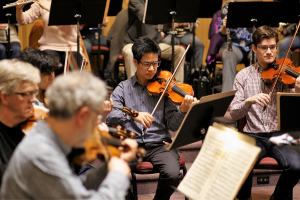Bach to the Future
London Symphonia composes an innovative, sustainable business model
Photo, from left: London Symphonia’s Andrew Chung, Joseph Lanza, Kate Stone and Shawn Spicer
ANDREW CHUNG WANTS you to know that London Symphonia is not an Orchestra London remix. It’s a brand-new ensemble, with new leadership and a new way of doing things.
“We’re still a work in progress, but we’ve got a great formula for the programming and artistic side of things, as well as a business model that works,” says Chung, who serves as the orchestra’s general manager as well as a member of its violin section.
While Chung is focused on London Symphonia’s future, many Londoners may remember the tumultuous end of Orchestra London, which filed for bankruptcy in May 2015.
Chung had joined the orchestra less than a year before and was part of the musician-led effort to keep the music alive under the #WePlayOn banner until the dust settled. When #WePlayOn rebranded as London Symphonia in November 2017, he stepped into the leadership role.
With its second full season coming to an end, Chung and his colleagues have shown that there’s an audience for professional orchestral music in London, and that it’s possible to maintain artistic excellence on a pared-down annual budget of only $500.000.
“Our operating model is very different from a traditional orchestra” —Andrew Chung
“Our operating model is very different from a traditional orchestra,” Chung notes. The ensemble performs in various downtown churches, and musicians are paid on a per-concert basis—a fundamental shift that enables London Symphonia to remain flexible and minimize financial risk.
Of course, it also means that previously salaried musicians are now freelancers. The majority of London Symphonia’s 28 core musicians are based in London, Chung says, and many also perform with other ensembles throughout Ontario and beyond. “These are very talented musicians who have incredible gifts to share with our community,” he says.
In many ways, London Symphonia is a musician-led orchestra.
Decisions are made by a nine-member board of directors and an artistic advisory council made up of concert master Joseph Lanza, principal trumpet Shawn Spicer and Chung.
Last season, the orchestra presented seven Main Series concerts, three Talbot Street series concerts and several special events including performances with Lebanese-Canadian poet Najwa Zebian, London singer-songwriter Sarah Smith and Juno award-winning concert pianist Janina Fialkowska.
In addition, Budweiser Gardens hired London Symphonia for its presentation of Harry Potter and Cirque Musica—a community partnership that would have been impossible under the old Orchestra London model.

Details about London Symphonia’s 2019/20 season will be announced by the end of the month.
“We’re looking to create programming that is fresh and that places us among the most forward-looking orchestras in Canada,” says Chung. “We know we have to offer events people want to come to. Every concert counts.”
The organization receives funding from three levels of government, as well as London Community Foundation and the Good Foundation. Chung says ticket sales and individual donations have also been strong.
“We still have a way to go to create corporate partnerships. That’s definitely an area of growth for us,” he comments. “But once we get people through the door to experience the excitement of our events, we believe it’s something business will really get behind. We just have to cultivate that interest.” ![]() Nicole Laidler
Nicole Laidler

